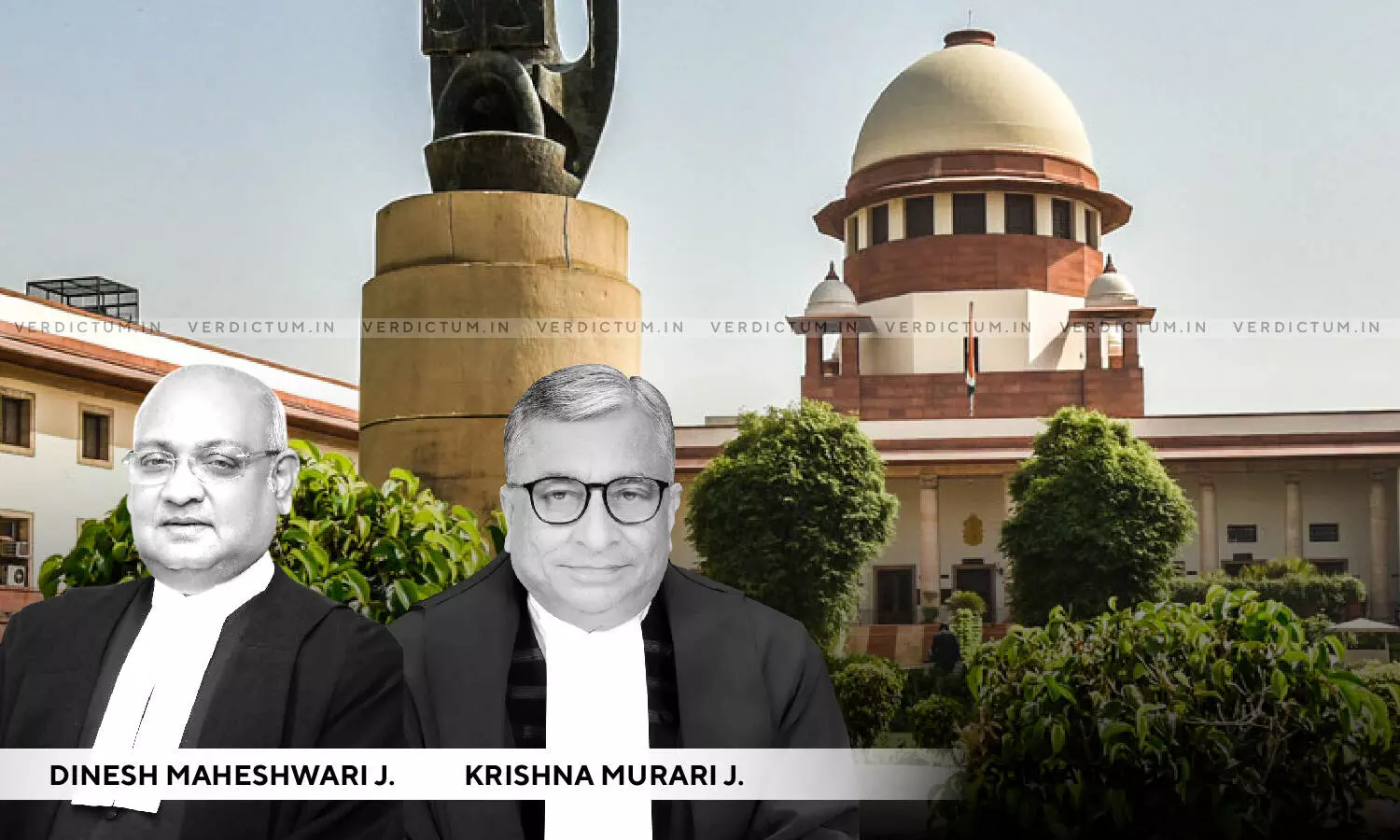
Article 136 Of Constitution Is Extraordinary Jurisdiction, Can Only Be Exercised Sparingly- Supreme Court Reiterates
 |
|The Supreme Court while considering a criminal appeal has reiterated that Article 136 of the Constitution of India is an extraordinary jurisdiction that has to be exercised sparingly.
A two-judge Bench of Justice Dinesh Maheshwari and Justice Krishna Murari while adjudicating upon a murder case observed -
"...it is important to reiterate that Article 136 of the Constitution of India is an extraordinary jurisdiction which this Court exercises when it entertains an appeal by special leave and this jurisdiction, by its very nature, is exercisable only when this Court is satisfied that it is necessary to interfere in order to prevent grave or serious miscarriage of justice. It is well settled by judicial pronouncement that Article 136 is worded in wide terms and powers conferred under the said Article is not hedged by any technical hurdles. This overriding and exceptional power is, however, to be exercised sparingly and only in furtherance of cause of justice."
The Bench dismissed an appeal filed challenging the order passed by the Andhra Pradesh High Court whereby the High Court had upheld the judgment by the Sessions Court judge and convicted the appellant under Section 302 of the Indian Penal Code and was sentenced to undergo life imprisonment and pay a fine of Rs. 500 failing which he would undergo a simple imprisonment for three months.
In this case, the deceased along with his son went to a village to sell their vegetables. While the son was weighing the vegetables the father went to a shop across the road to purchase tobacco leaves. Seeing him at the shop the appellant armed himself with a knife and came to the shop. The appellant first threw chilli powder in the eyes of the father and stabbed him in the chest and abdomen resulting in grievous injuries. The appellant fled and the father was taken to the hospital where he was declared dead.
An FIR was filed on the basis of the report of the son at Amravathi Police Station for offence punishable under Section 302 of the Indian Penal Code. The police went to the place of occurrence held an inquest, examined witnesses and arrested the appellant and filed a chargesheet. A trial took place and the appellant was convicted and sentenced to life imprisonment under Section 302 of the Indian Penal Code. An appeal was filed in the High Court, the High Court confirmed the judgment of the Trial Court and observed that there is no iota of doubt in the case of the prosecution and therefore, the prosecution has discharged its burden in proving the guilt of the accused for the offence under Section 302 IPC beyond a reasonable doubt.
It was submitted by Advocate Ravindra S. Garia, counsel for the appellant had submitted that the weapon which was alleged to have been used was not seized by the Police, he also submitted that there was a delay in sending the FIR to the Court. He also submitted that the eye witnesses were doubtful as none of the eye witnesses were even able to describe the weapon of the offence. On the Contrary the Counsel for the Respondent, Advocate Mahfooz A. Nazki supported the conviction and the sentence that was granted by the trial court and then upheld by the High Court and stated that there was no ground for the reversal of the conviction.
The Supreme Court while pronouncing the judgment has reiterated on the powers available with the court under Article 136 of the Constitution of India. The Court has stated that, "it is important to reiterate that Article 136 of the Constitution of India is an extraordinary jurisdiction which this Court exercises when it entertains an appeal by special leave and this jurisdiction, by its very nature, is exercisable only when this Court is satisfied that it is necessary to interfere in order to prevent grave or serious miscarriage of justice." The Court went on to explain that, "This overriding and exceptional power is, however, to be exercised sparingly and only in furtherance of cause of justice. Thus, when the judgment under appeal has resulted in grave miscarriage of justice by some misapprehension or misreading of evidence or by ignoring material evidence then this Court is not only empowered but is well expected to interfere to promote the cause of justice."
The Court went on to state that, "It is only in rare and exceptional cases where there is some manifest illegality or grave and serious miscarriage of justice on account of misreading or ignoring material evidence, that this Court would interfere with such finding of fact."
The Court in the appeal before it held that, "upon appreciation of evidence of the eyewitnesses and other material adduced by the prosecution, the Trial Court as well as the High Court were right in convicting the appellant for the offence under Section 302 IPC. Therefore, we do not find any ground warranting interference with the findings of the Trial Court and the High Court."
Click Here To Read/Download the Judgment